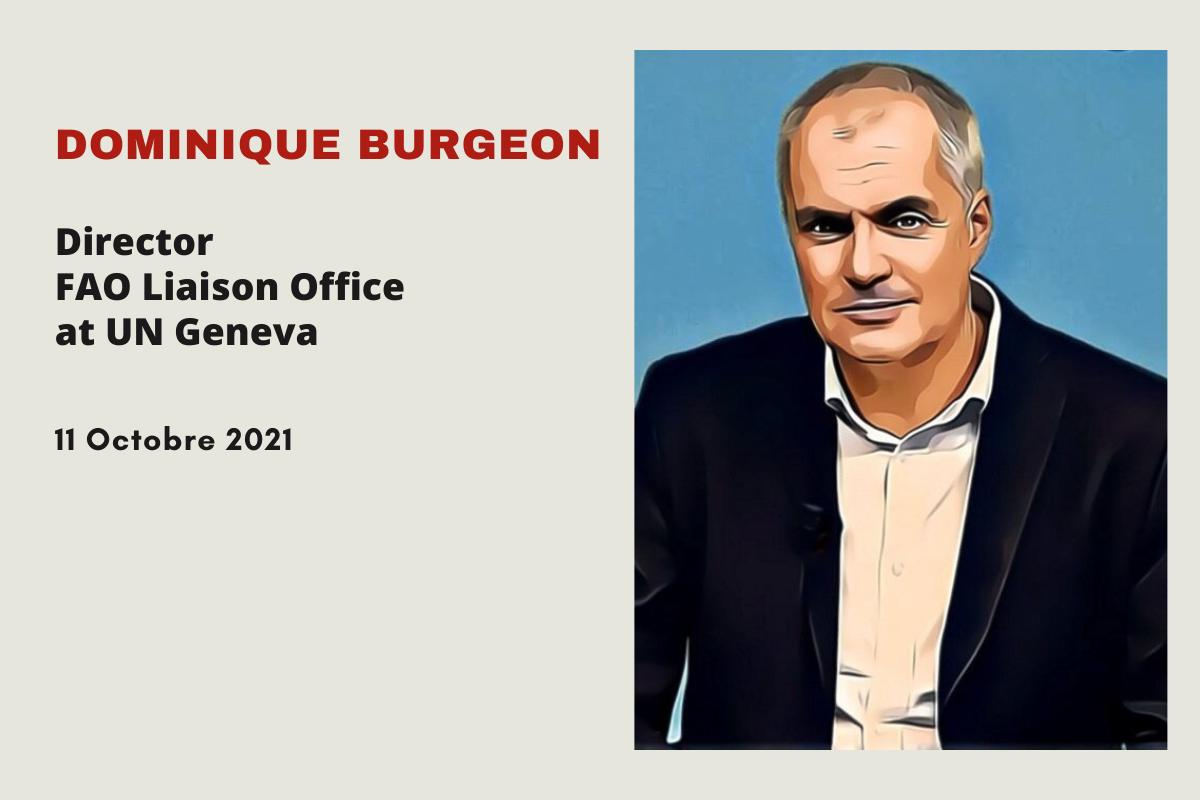The Interview | Dominique Burgeon
 | Could you tell us briefly what your organization does? What is your role? What is your goal? |
The Food and Agriculture Organization (FAO) is a specialized agency of the United Nations that leads international efforts to fight hunger. Our goal is to achieve food security for all and make sure that everyone has access to enough good-quality food to lead an active, healthy life. FAO is present in over 130 countries worldwide. We help governments and their partners design and implement targeted policies, programs, and laws that promote food security and nutrition. Our headquarters are in Rome, Italy. The FAO Liaison Office with the United Nations in Geneva (LOG) was established in the early 1960s and since 1971 has been hosted by the United Nations Office in Geneva (UNOG).
My role, with the help of my team, is to ensure that we pro-actively advance our three central objectives: (1) we represent the FAO to the United Nations system in Geneva and foster cooperation and partnerships with other Geneva-based international organizations; (2) we establish and maintain contact with the permanent missions to the United Nations in Geneva; and (3) we actively promote the work of the FAO and develop relationships with our Swiss partners.
Since arriving in Geneva, my main goal has been to implement a new operational model within the FAO Liaison Office, in line with the priorities defined by our Director-General, Mr. Qu Dongyu. These are (1) to promote FAO's contribution to the 2030 Agenda through its new Strategic Framework 2022-2031, a roadmap that lays out the agency's priorities for the next decade to facilitate the transition to more efficient, inclusive, resilient, and sustainable agri-food systems that improve production, nutrition, environmental protection and living conditions (the four improvements), leaving no one behind; (2) to monitor and contribute to the work of the United Nations governing bodies and other international organizations in Geneva; (3) to promote selected topic and policy areas of interest, such as humanitarian aid, resilience, trade, health, and ecosystem restoration for sustainable production, nutrition and food safety.
 | Among the concentration of actors in Geneva (OIs, NGOs, permanent missions, academia, and the private sector), who do you work with and how? |
Our activities – many of them jointly organized with our partners – aim to inform the general public and the international Geneva community about the FAO's mandate and raise awareness of how our work contributes to the eradication of global hunger. The FAO Liaison Office with the United Nations in Geneva has expertise in the areas of trade, humanitarian aid, and resilience, animal health and antimicrobial resistance (AMR), social development, the Codex Alimentarius international food standards, food safety and nutrition. We work closely with Member States, international organizations, the Swiss government, universities, the private sector, the media, NGOs, and local partners.
A good example is the commemoration of World Food Day 2021 (WFD2021) on October 16, a date that coincides with the founding of FAO, on October 16, 1945. Every year, on World Food Day, we set up a temporary exhibition in the main hall of Cornavin train station, in partnership with the Swiss Federal Office of Agriculture (FOAG), Partage Foundation (the Geneva food bank), the city of Geneva, and Association Ma-Terre. This year, the exhibition aims to raise awareness of the need for more efficient, inclusive, resilient, and sustainable agri-food systems for better production, better nutrition, a better environment, and a better life, leaving no one behind.
At a time when more than 800 million people globally experience hunger every year and poverty and hunger have recorded the fastest annual increase in decades, due in large part to the Covid-19 pandemic, WGA 2021 is a call to action. All parts of the economy need to mobilize and help make the changes necessary to ensure our food systems provide affordable, nutritious and, safe foods for all. In partnership with the World Food Program (WFP) and the United Nations High Commissioner for Refugees (UNHCR), we will be hosting a discussion titled "Celebrating efforts to strengthen local food systems for displaced and host communities".
Beyond that, we are working with other United Nations agencies and Member States to launch a series of conversations on areas of special relevance to the international Geneva community. The key themes are 1) trade, with trade talks on agriculture, 2) humanitarian aid and resilience, with a monthly joint briefing with WFP, 3) "One Health" discussions, and 4) the United Nations Decade for Ecosystem Restoration. These focused discussions also aim to create a venue to debate important issues, and for States to share their best practices. The monthly FAO-WFP food security briefings have led to some very interesting discussions on a range of different issues, including Afghanistan, Sudan, Haiti, the Horn of Africa, the food crisis in the context of the United Nations Summit on Food Systems, and anticipatory actions.
 | What are the strengths and weaknesses of Geneva with regards to the development of your activity? |
Geneva is the second most important center of diplomacy after New York. With 181 permanent missions accredited to the United Nations Office at Geneva, more than 40 international organizations and hundreds of non-governmental organizations, as well as several leading scientific and academic institutions, civil society organizations, and private sector actors, Geneva plays a crucial role in facilitating multilateral action in trade, humanitarian aid, and development. Geneva is where international efforts to address global challenges are discussed and coordinated, from climate change to the unprecedented impact of the COVID-19 pandemic, as well as efforts to achieve the Sustainable Development Goals (SDG) by the end of the "Decade of Action" in 2030, including the goal of eradicating hunger and all forms of malnutrition. As our Director Dr. Qu Dongyu noted recently, we only have nine farming seasons left (or less than 10 years!) to meet the SDGs. Geneva will play a central role in all these efforts.
I don't think international Geneva has any real weaknesses; on the contrary, I see big opportunities. The world we live in faces multiple challenges, from the long-standing problems of hunger and poverty to global pandemics like COVID-19 to climate change. All these challenges are interconnected, and Geneva is well placed to serve as a hub for discussions and to propose concrete solutions and actions that make a difference on the ground. The FAO office in Geneva is part of this effort. We focus on raising awareness within the international Geneva community about the transformation of agri-food systems, by providing both information and significant technical assistance to members and partners.
 |
|
The COVID-19 pandemic has shown us how interconnected yet fragile our global community really is. Global dialogue and cooperation are crucial given the myriad of challenges we face: the long-standing, and still unreached, the goal of eradicating poverty and hunger, the impact of climate change that can be observed around the world, economic crises, growing inequality, and armed conflict, to name only a few. Multilateralism is more necessary than ever. To overcome these challenges, we will need effective and efficient global governance. We will also need a more proactive and open multilateral system. One that is attentive to people's concerns and the needs of our planet, and able to react quickly and implement actions on the ground that transform people's lives by delivering better living conditions and dignity for all. It will be hard, but I believe we will get there, provided we come together as one. We are all in the same boat: the only way forward is to work together to address and overcome these challenges. Our humanity should always come first.
The FAO is strongly committed to this approach to global governance, which can only be beneficial to our work on the ground. We are present in over 130 countries to translate discussions and technical and policy recommendations into tangible results on the ground. Among the measures we support, are building long-term resilience; taking anticipatory actions to prevent humanitarian and climate crises; using innovation and technology to enable more sustainable agri-food systems, from farm to table, and to adapt to climate change; better managing scarce water supplies; and preventing food waste and food loss to better use and protect our natural resources. Engaging with youth is another key element of our work. We have launched several initiatives, including Hand-in-Hand, an evidence-based, country-led, and country-owned initiative to accelerate the agricultural transformation and sustainable rural development, and 1000 Digital Villages, which aims to advance and improve livelihoods, agriculture, nutrition, health, and well-being of communities. These are all examples of tangible, long-term solutions on the ground.
We also recognize that young people play a central role in shaping our future and we include them in our discussions. A good example of this is the World Food Forum (WFF), a youth-led initiative that engages young people to play a leading role in transforming our agri-food systems for better production, better nutrition, a better environment, and a better life for all, leaving no one behind!
